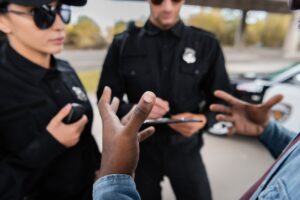
While it may not be an everyday occurrence, it’s certainly not unheard of to see a police vehicle outside of its normal jurisdiction. For example, maybe you saw a St. Paul police officer while you were in downtown Minneapolis. Many people who see a cop out of their jurisdiction may wonder if that officer can pull them over, of if they are immune since the officer is not in the area they normally oversee. In today’s blog, we explain if an officer can pull you over outside of their jurisdiction.
Pulled Over Outside Of Jurisdiction
In order for police to conduct a legal traffic stop, they must have reasonable suspicion for doing so. The bar for reasonable suspicion is very low, and as we’ve talked about on the blog in the past, an officer can pull you over even if they are misinformed, so long as they believed they were acting in good faith, like if your vehicle matched the description of a stolen vehicle and a traffic stop revealed that you were driving under the influence of alcohol. So if the officer has reasonable suspicion, can they pull you over even if they are outside of the area they have been sworn to protect?
As you can imagine, the answer is “it depends.” In the vast majority of cases, officers are working within their jurisdiction, and they can connect with another department if an issue spills into a neighboring town or county. However, there are instances where a police officer will pull over an individual or write a citation outside of their standard jurisdiction, and suspects may wonder if this is even legal.
In most cases, so long as the officer was engaged in police related duties at the time of the incident, they can legally pull you over. For example, if the officer from St. Paul was picking up some files from the Minneapolis Police Department and witnessed a traffic violation in Minneapolis, they could legally pull that driver over and handle the case like it was in their jurisdiction. As long as they are acting within the scope of their employment or performing job duties at the time, they can act as a police officer despite technically being out of their jurisdiction.
The same goes for when an incident begins in their jurisdiction and takes them out of their jurisdiction. For example, if the officer is pursuing a suspect or attempting to conduct a traffic stop, the suspect doesn’t just get to flee freely if they cross the county line. If the matter begins within their jurisdiction, they are authorized to continue into other areas to resolve the incident.
Police officers are pretty aware of their jurisdiction and aren’t looking to find trouble outside of the area they are sworn to protect, but if the scope of their job takes them outside those lines, oftentimes they can legally conduct normal police business. It’s unlikely that you can get traffic charges dropped simply because an officer was out of their jurisdiction, but it’s certainly something we’ll look into when determining the best defense plan.
For more information, or for help with a criminal case, reach out to Avery and the team at Appelman Law Firm today at (952) 224-2277.





